Apply now to join our next cohort of Community Science Fellows and Community Leads!
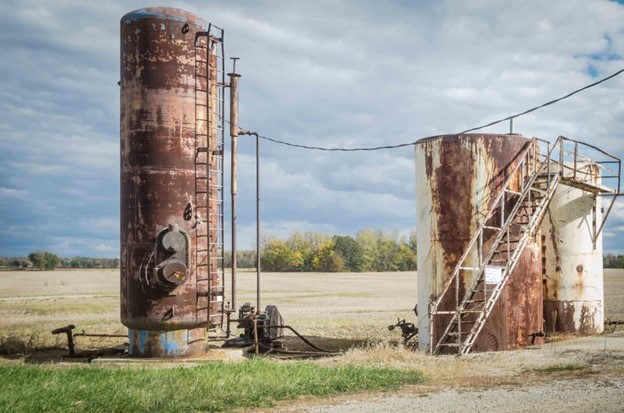
Photo: Mosher Unit Class II injection well in Cardington, Morrow County, OH. Credit Columbus Community Bill of Rights
Oil and gas companies have been granted permits to inject toxic, radioactive fracking waste into Class II injection wells within Columbus Metro watersheds, which provide drinking water for more than 1.2 million residents of the greater Columbus area. As of 2023, there are 13 injection wells upstream of Columbus metro located in Delaware and Morrow counties which have been injected with millions of gallons of oil and gas waste, euphemistically called “brine”. This waste can contain more than 1,000 different chemicals, of which many are carcinogens, neurotoxins, and endocrine disruptors, and also contains radium 226 and 228, in addition to other radionuclides.
The Columbus Community Bill of Rights group monitored baseline water quality in publicly-accessible stream sites both upstream and downstream of injection wells in Morrow and Delaware counties from August 2021 to August 2022. While no evidence of brine leaks or spills were detected in this year, this baseline study could help determine if there is a measurable impact from the injection waste releases in the future. CCBOR stresses that the best practice would be to have continuous monitoring near the wells to hold the industries accountable for leaks, spills, or migration of the liquid waste into the water supply. As part of the group’s objective to protect their water, it aims to pass the Columbus Community Bill of Rights charter amendment to give citizens the legal right to say no to current and future oil and gas industry contamination in their watersheds.
The immediate goal of this water testing initiative was to motivate the need for long-term water quality monitoring by the City of Columbus near the injection wells. Ultimately, the goal of this and related work is to ensure a ban on injection well permits, solid frack waste (drill cuttings) disposal in landfills within the watershed, and spreading oil and gas brine for dust and ice control.
To read the Final Water Quality Report, click here.
This project is officially complete, but the team is open to new collaborators in their longer term ongoing efforts. If interested, see how to get in touch with us below:
Interested in volunteering as a scientist? Apply now!
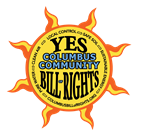
Columbus Community Bill of Rights
https://columbusbillofrights.org/
In Central Ohio, the waterways of the region make up the Upper Scioto watershed, which provides drinking water for more than 1.2 million people in the Columbus metro area alone1.
The fracking waste in the injection wells located in the Upper Scioto watershed comes from the Utica and Marcellus Shale formations which have high levels of naturally occurring radioactive elements, primarily radium 226 and 228. As a result, this waste can have radiation levels up to 3,600 times over the U.S. Environmental Protection Agency’s safe drinking limits2. In part because of federal loopholes, millions of tons of solid and trillions of gallons3 of liquid radioactive oil and gas waste are being disposed of nationwide as if they were safe. Radium 226 is particularly troubling because it will remain radioactive for thousands of years, as it has a half-life of 1,600 years. Oil and gas production waste brines injected into the Columbus Metro watershed between 1982 and 2020 within Morrow County equate to an amount that would fill more than 1,011 Olympic-sized swimming pools, almost 16 million barrels.
Columbus Community Bill of Rights (CCBOR) was formed in 2014 by a group of concerned citizens in order to protect their water from oil and gas industrial harms. CCBOR is a grassroots, all-volunteer group that believes all people have inalienable rights to safe water, soil, and air, as well as the right of local self-governance to prohibit substances and activities that would violate those rights. CCBOR also recognizes the rights of ecosystems and natural communities within the city to be free from such harmful activities. Throughout their four campaigns more than 50,000 Columbus residents have signed their petitions.
CCBOR used their water quality testing to determine if there was any current impact by the injection wells, and to establish a baseline data set for future comparisons. They aim to use the study and its resulting report motivate the city and state to take greater protection of the watersheds, keeping in mind that these injection wells may leak at any time in the future. These actions will provide impetus to pass the Columbus Community Bill of Rights charter amendment.
CCBOR has worked to give Columbus citizens a legal voice in decisions relating to oil and gas. The group has partnered with the Community Environmental Legal Defense Fund (CELDF) to create a charter amendment that would eliminate fracking and frack waste dumping in the community. Beginning in 2014, CCBOR has submitted four ballot initiatives and each time, either the City Council, Board of Elections, the state legislature or the courts have prevented the charter amendment from reaching the ballot.
Links to background documents and resources relevant to the project:
CCBOR members, with the training and guidance of scientists, tested the stream water up- and downstream of injection wells in Morrow and Delaware counties from August 2021 to August 2022. To test for injection well leaks or spills of the highly salty “brines”, the team went out every two weeks to measure total conductivity (basically, the saltiness) of 9 sites, along with other basic water quality parameters (total dissolved solids, temperature, and turbidity). Quarterly, CCBOR and the Stolz lab group at Duquesne University collected samples for measurements of brine-indicating ions, dissolved metals, and methane.
The study plan and monitoring sites were designed and selected by Dr. Christopher Spiese, an associate professor at Ohio Northern University.
See published technical report above.
CCBOR is continuing the project with the aim of continuous conductivity monitoring with Dr. Karen Knee, professor at American University.
Dr. Chris Spiese designed the study in 2020 after discussion with CCBOR members. In May 2021, the Thriving Earth project began. In June 2021, the Sierra Club Ohio chapter donated conductivity meters that the group began to use for biweekly stream measurements. In August 2021, Dr. John Stolz and his lab members drove from Pittsburgh to meet CCBOR members for the first of 4 field trips to collect samples, which were measured back at Duquesne University. Several CCBOR members contributed to what would eventually be over 25 field trips in all weather, generating a year long baseline water quality data set.
By early 2023, all the laboratory measurements were complete and CCBOR began to write a report, generate plots, and contextualize its findings. The report was completed in August 2023 and will soon be available on CCBOR’s webpage with an accompanying white paper on the risks to drinking water in the Columbus area from oil and gas extraction activities. While no indications of brine releases (spills or leaks) were detected by high downstream salinity or indicator ions from August 2021-August 2022, it is imperative to have such a high quality baseline of water chemistry throughout the year, in case a spill occurs in the future.
To continue to monitor this critical watershed for Columbus metro, in early 2022, the group also began a collaboration with Dr. Karen Knee at American University to establish continuous conductivity monitoring select stream sites, and to collect streambed sediment samples for radium isotope analysis. This work is ongoing.
 Carolyn Harding is a grassroots activist committed to protecting our Water, Air, Soil and Rights for the sake of all life on this planet. She is a co-organizer with the Columbus Community Bill of Rights (ColumbusBillofRights.org), working to give Columbus citizens the right to say No to fracking & radioactive frack waste dumping. She is host and producer of #GrassRoot_Ohio Radio/Podcast -conversations with activists working on social, racial, economic and environmental justice. The half hour show airs & streams on Fridays, 5pm @ wgrn.org and is found on SoundCloud, Apple & Spotify. Her family, good- food/people/stories/red wine and coffee ward off prone and fetal positions.
Carolyn Harding is a grassroots activist committed to protecting our Water, Air, Soil and Rights for the sake of all life on this planet. She is a co-organizer with the Columbus Community Bill of Rights (ColumbusBillofRights.org), working to give Columbus citizens the right to say No to fracking & radioactive frack waste dumping. She is host and producer of #GrassRoot_Ohio Radio/Podcast -conversations with activists working on social, racial, economic and environmental justice. The half hour show airs & streams on Fridays, 5pm @ wgrn.org and is found on SoundCloud, Apple & Spotify. Her family, good- food/people/stories/red wine and coffee ward off prone and fetal positions.
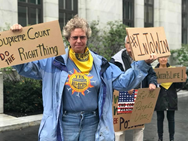 Kathy McGlone was raised in Columbus and received her BS from OU in Field Biology in the Botany Department. She received her teacher certification from OSU. Kathy taught Biology, Basic Biology, Ecology, Earth and Space Science and Physical Science in Southeast Ohio for 30 years. She received her Masters Degree in Environmental Science from OU. The county where she resided, Monroe, was inundated or destroyed by fracking. Kathy retired in 2013 and joined CCBOR.
Kathy McGlone was raised in Columbus and received her BS from OU in Field Biology in the Botany Department. She received her teacher certification from OSU. Kathy taught Biology, Basic Biology, Ecology, Earth and Space Science and Physical Science in Southeast Ohio for 30 years. She received her Masters Degree in Environmental Science from OU. The county where she resided, Monroe, was inundated or destroyed by fracking. Kathy retired in 2013 and joined CCBOR.
 Bill Lyons is a mathematics and science teacher who has taught nearly 40 years on four continents at the high school and college levels. He is a co-organizer of the Columbus Community Bill of Rights group and is president of the Ohio Community Rights Network. He has been an activist since 2015 when he got involved in the community rights and rights of nature movements because he is passionate about local democracy and social and environmental justice.
Bill Lyons is a mathematics and science teacher who has taught nearly 40 years on four continents at the high school and college levels. He is a co-organizer of the Columbus Community Bill of Rights group and is president of the Ohio Community Rights Network. He has been an activist since 2015 when he got involved in the community rights and rights of nature movements because he is passionate about local democracy and social and environmental justice.
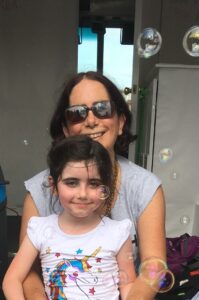
Karen L. Knee (she/her) is an associate professor in the Environmental Science department at American University in Washington, DC. She grew up in Charleston, SC, and studied Environmental Science at Brown University (undergraduate) and Stanford University (Ph.D.). Before joining the AU faculty in 2012, she was a Fulbright scholar in Ecuador, where she investigated how mining and other land uses affected water quality in cloud forest streams, and a Smithsonian postdoctoral fellow. Karen’s research focuses on water quality, water pollution, and using naturally occurring radioisotopes as tracers of environmental processes. She lives in Greenbelt, MD with her partner Charlotte, her daughter Maggie, two dogs, and a cat. In her free time, she enjoys reading, swimming, hiking, traveling, cooking, and community service.
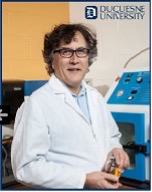
John Stolz is Director of the Center for Environmental Research and Education; Professor, Environmental Microbiology Bayer School of Natural and Environmental Sciences Department of Biological Sciences; Center for Environmental Research and Education at Duquesne University in Pittsburgh, PA. John is interested in both fundamental questions in microbial ecology as well as the application of unique microbial species for bioremediation. There are three major areas of interest in his lab:1) the ecophysiology, biochemistry, and molecular biology of dissimilatory metal reducing bacteria, 2) the ecophysiology of phototrophic prokaryotes and 3) the environmental impacts and microbiology of unconventional shale gas extraction. John has a Ph.D. in Biology from Boston University.
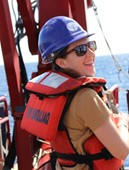 Megan Duffy is a biogeochemist interested in how carbon is transformed and transported across different interfaces: between rivers and oceans, and from algae to deep ocean sediments. She’s passionate about community-based research that builds knowledge and tools for climate adaptation on an ecosystem scale. Megan got her PhD in Oceanography from the University
Megan Duffy is a biogeochemist interested in how carbon is transformed and transported across different interfaces: between rivers and oceans, and from algae to deep ocean sediments. She’s passionate about community-based research that builds knowledge and tools for climate adaptation on an ecosystem scale. Megan got her PhD in Oceanography from the University
of Washington in early 2022. After a short stint as a scientist at Earthjustice working to challenge oil and gas projects internationally, she recently began postdoctoral fellowship at the University of Vermont to study how warming winters are impacting soil and water quality.

Ohio Community Rights Network (ohiocrn.org)
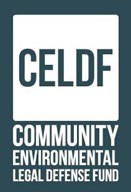
Community Environmental Legal Defense Fund (CELDF) (celdf.org)
(c) 2024 Thriving Earth Exchange